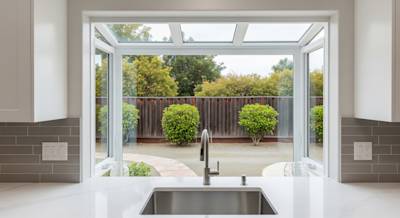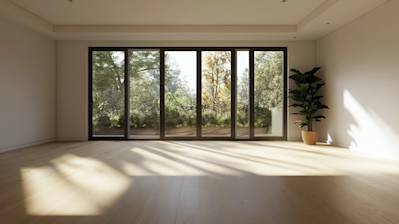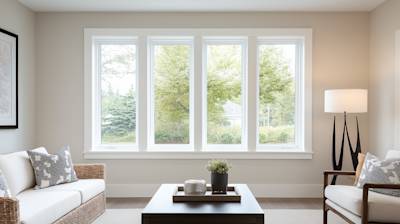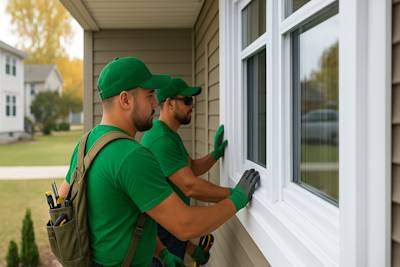Whether you're a homeowner, property manager, or a tenant, dealing with window moisture buildup can be quite a challenge. A common issue causing a variety of problems —from mold growth to chipping paint— consequently lowering the appeal and value of houses. This article takes a deep dive into the causes and solutions for window moisture buildup.
Understanding Window Moisture Build-up
Before delving into the details of preventing and mitigating window moisture, it's essential to understand what it is. Window moisture build-up, otherwise known as window condensation, is a phenomenon that occurs when warm, moist air comes into contact with a colder surface, condensing and forming water droplets. During cold temperature months, your windows become the cold surfaces where this condensation happens.
What Causes Window Moisture Build-up?
Several factors can cause window moisture build-up:
- High indoor humidity: Homes with high levels of humidity are prone to condensation because the moisture in the air needs a place to go. Everyday activities such as cooking, showering, or even a dryer machine can contribute to high humidity indoors.
- Poor ventilation: Inadequate ventilation limits the flow of air and prevents the moisture from escaping, leading to a buildup on your windows.
- Weather changes: Changes in outdoor weather can also cause moisture build-up. A shift from cold to warm weather can cause condensation to form on your windows.
Implications of Window Moisture Build-up
Window moisture build-up is more than just an aesthetic issue. Ignoring window condensation can lead to:
- Mold and mildew: These fungal growths thrive in damp conditions and can cause health issues, including allergies and respiratory problems.
- Rot and damage to window frames: Prolonged exposure to moisture can cause wooden window frames to rot and may even damage the wall area around your windows.
- Decreased window efficiency: Moisture build-up may damage the seals of your windows, affecting their insulating properties.
How To Prevent Window Moisture Build-up
Dealing with window moisture is not about complete elimination but management. Here are practical ways to manage and prevent it:
- Increase ventilation: Proper ventilation can drastically reduce humidity levels and limit condensation. Consider installing exhaust fans in areas prone to high moisture, like bathrooms or kitchens.
- Use a dehumidifier: Dehumidifiers remove excess moisture, making them perfect for controlling indoor humidity levels.
- Insulate your windows properly: Insulated windows resist condensation by keeping the inner surface of the window warmer. Double-pane or triple-pane windows will work perfectly.

Frequently Asked Questions about Window Moisture Buildup
How Can I Prevent Window Moisture Buildup?
If you're tired of dealing with ceaseless window moisture buildup, don't worry. There are several ways to prevent it. That includes improving your home's ventilation, using moisture eliminators, investing in a dehumidifier, or even replacing your windows for ones with better insulated glazing.
What are the Consequences of Ignoring the Window Moisture Buildup?
Ignoring window moisture buildup isn't recommended. Over time, persistent moisture can lead to mold growth, which can potentially lead to health issues such as allergies and respiratory problems. It can also harm the window sill, cause peeling paint, and reduce the overall lifespan and performance of your windows.
Can Window Moisture Buildup Damage My Window Frames?
Yes, prolonged exposure to moisture buildup can cause serious harm to your window frames. It can cause the frames to rot, warp or get discolored, particularly if they are wooden frames. It can also lead to the peeling of paint, negatively impacting your home's visual appeal.
Can Window Moisture Buildup Lead to Mold?
Indeed, it can. Moist and damp conditions created by window moisture buildup can act as a breeding ground for mold. This can lead to mold growth on your sills or walls, which can have detrimental effects on your health and your home's aesthetics.
Will Changing My Windows Reduce the Moisture Buildup?
If your current windows are old, drafty, or not well insulated, changing them could potentially alleviate your window moisture buildup issue. Opting for double or triple-pane windows can substantially minimize condensation, as they are better at maintaining the indoor temperature against the outdoor cold.
How Often Should I Clean My Windows to Avoid Moisture Buildup?
While there's no strict rule, it’s a good idea to clean your windows at least once or twice a month to avoid moisture buildup. However, if you notice condensation frequently forming on your windows, it may be ideal to clean them more regularly.
Can Window Treatments Help in Avoiding Window Moisture Buildup?
Window treatments such as thermal curtains, cellular shades or blinds can help to reduce window moisture buildup. They do so by aiding in temperature regulation, preventing warm indoor air from coming directly in contact with the cold surface of the windows.
Is There a Specific Season for Window Moisture Buildup?
While window moisture buildup can happen in any season, it is generally more prevalent during colder months. This is due to the stark difference between the warm air inside and the cold air outside creating condensation on windows.
Pros of Window Moisture Buildup
When we think about window moisture buildup, or condensation, we tend to focus on the negative implications. However, there are also some positive aspects to consider.
Humidity Control
Increased Indoor Humidity
Believe it or not, window moisture buildup can actually work to increase indoor humidity levels. During the winter months, when central heating can result in dry indoor air, window condensation can help to replenish moisture, thus making your living space more comfortable. This can be particularly beneficial to individuals who are prone to allergies or dry skin.
Indicator of Indoor Humidity Levels
Furthermore, window condensation can also give you an insight into the humidity level inside your home or office. Condensation is likely to occur when there is high moisture content in the air, which can aid in determining when to use a dehumidifier or when to ramp up your air ventilation.
Potential Energy Savings
Insulation Clue
In some cases, window condensation may provide a hint about insulating properties of your home. Specifically, a double-paned window with moisture buildup in between the panes indicates a failed seal, which can reduce the window’s insulating properties, leading to energy loss. This can prompt you to take necessary actions to either repair or replace your windows for better energy efficiency.
Cons of Window Moisture Buildup
Despite these advantages, oftentimes, the drawbacks associated with window moisture buildup outweigh the benefits.
Structural Damage
Wood Damage
One of the major negative impacts can be the damage caused to wooden window frames. The prolonged exposure to moisture can cause the wood to rot, gradually impairing the structural integrity of your windows. This could lead to substantial replacement or repair costs in the long run.
Wall Damage
In addition, the continuous build-up of moisture can cause damage to the walls adjacent to the windows. This could lead to a range of issues like wallpaper peel, paint discoloration or even a more serious problem such as mold growth.
Health Hazards
Fungal and Mold Growth
High humidity levels can spur the growth of mold and mildew, which are potential health hazards. These can cause allergic reactions in some individuals, or even more serious respiratory problems.
Asthma Triggers
Furthermore, prolonged exposure to dampness can exacerbate asthma symptoms. In particular, dust mites, which thrive in damp environments, can trigger asthma attacks in susceptible individuals.
Reduced Visibility
Obstructed Views
Window moisture buildup can create a hazy view or fog effect, which can obstruct the outside view through the window.
Energy Inefficiency
Despite the fact that condensation in between window panes may highlight a potential insulation problem, the existence of this condensation signifies that you are losing heat in the winter and cool air in the summer, resulting in raised energy bills.
Seal Failure
If moisture builds up in between your window panes, it means that the seal has failed. This seal failure compromises the window's insulating capacity, which can result in increased energy consumption to maintain your home's temperature.
Decreased Property Value
Persisting issues with window condensation could potentially deter a prospective buyer as they may foresee repair or replacement costs in the future, hence reducing the value of your property.
In materializing their pros and cons, it is safe to assert that while window moisture buildup can have some surprising advantages, the long-term detrimental effects make it something to monitor and avoid when possible. Regular checks, good home ventilation, and maintenance could help you avert most of these problems.
Summary
The issue with window moisture buildup can often be traced back to humidity inside the home. This is common during colder months when we try to keep our homes warm and cozy. Excess moisture in the air condenses on the cold window glass, causing fogging and droplets. However, besides being unsightly, it can also lead to significant problems over time such as mold, mildew, rot and even structural damage to your house.
Addressing window moisture buildup can involve many methods depending on the extent of the problem. For instance, regular use of a dehumidifier can help maintain a balanced indoor humidity. Alternatively, improving ventilation by cracking open a window or installing exhaust fans can be beneficial as well. Nature can help too. Houseplants absorb moisture from the air, they can definitely play a role in managing humidity levels.
Window moisture buildup is not just a surface-level problem but a reflection of deeper issues in your home's climate control. So, it's vital to address it promptly and thoroughly. Consider investing in insulation, double-paned windows, or other similar upgrades to prevent the problem from recurring in the future. Ultimately, maintaining an ideal balance of temperature and humidity will not only solve this problem but also make your space comfortable and healthier.
About GVD Renovations & Remodeling
At GVD Renovations & Remodeling, we bring unmatched expertise and passion to all things home renovation. As Roseville, CA's premier home remodeling and renovation specialists, we invite you to experience the difference our team of skilled craftspeople can make. Whether you're thinking about a major home renovation project or a small, specific job, we provide extensive services to suit your needs, from Sacramento window replacement to full home remodeling. With our commitment to quality, value, and professionalism, you'll soon see why the residents of Roseville and beyond have entrusted us with their homes for so many years. Let's roll up our sleeves and bring your vision to life!
This article is for general information only and not professional advice. Always consult a licensed contractor before making project decisions. Product details, specifications, or warranties may have changed since publication. Brand and product mentions reflect opinion, not endorsements or guarantees.
Tags: Window condensation, Moisture problem, Indoor humidity,



















